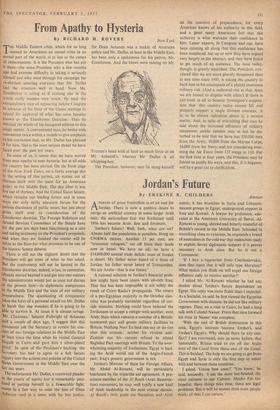Jordan's Future
By ERSKINE
APERIOD of great frustration is at an end for Jordan. There is now a positive desire to merge an artificial country in some larger Arab unit; the nationalism that was Jordanian until 1956 has become Arab, first and foremost.
`Jordan's future? Well, look, what are we? Almost half the population is penniless, living on UNRWA rations. Another 15 per cent. are "economic refugees," cut off from their lands now in Israel. We have no oil; we have a il4,000,000 annual trade deficit; most of Jordan is desert. My father never heard of a State of Jordan; his father never heard of Transjordan. We are Arabs—that is our future.'
A rational solution to Jordan's financial prob- lem might have been union with oil-rich Iraq. That this has been impossible is not solely the result of Cairo Radio's propaganda. The return of a pro-Egyptian majority in the October elec- tions was probably inevitable regardless of out- side stimulus. Nothing could have induced the Jordanians to accept a merger with another, even Arab, State which remains a member of a British- sponsored pact and grants military facilities to Britain. Nothing Nuri Es-Said can say or do can alter this attitude: neither his virulent anti- Zionism nor his current refusal to attend Baghdad Pact meetings with Britain. To the over- whelming majority of Jordanians, Egypt is lead- ing the Arab world out of the Anglo-French past; Iraq's present government is not.
Jordan's Minister of State for Foreign Affairs, Mr. Abdul Al-Rimawi, will be particularly heartened by the tripartite aid agreement. A pro- minent member of the Al Booth (Arab Resurrec- tion) movement, he may well typify a new kind of Arab leadership in the next critical decade. Al Hinnies twill goals are Socialism and Arab union; it has branches in Syria and Lebanon; nascent groups in Egypt, underground support in Iraq and Kuwait. A lawyer by profession, edu- cated at the American University of Beirut, -Al- Rimawi is young, shrewd and bitterly resentful of Britain's record in the Middle East. Schooled in something close to cynicism, he expounds a brand of neutralism in the cold war that makes him ready to exploit Soviet diplomatic support if it proves necessary to Arab aims. But he is not a Communist.
'If I buy a typewriter from Czechoslovakia, does that mean that it will only type Marxism? What makes you think we will expel one foreign influence only to receive another?'
I asked Mr. Al-Rimawi whether he had any doubts about Jordan's future dependence on Egypt. His reply was more frank than I expected. As a Socialist, he said, he first viewed the Egyptian Government with distaste; he did not like military regimes. Then, on a visit to Cairo, he had a long talk with Colonel Nasser. From that time forward his trust in Nasser was complete.
'With the end of British domination in this area, Egypt's interests become Jordan's, and Jordan's Egypt's. Why should there be any con- flict? I am convinced, now as never before, that historically, Britain tried to cut off the Arabs west of the Canal from those east of the Canal. This is finished. The help we are going to get from Egypt and Syria is only the first step in union with and between those countries.'
I asked, 'Union how soon?' You know,' he said, amusedly, am the most hot-headed, the most extreme in our Cabinet. Maybe I'm too hopeful; these things take time, there are legal problems. But it will be sooner than most people think: of that I am certain.'


































 Previous page
Previous page